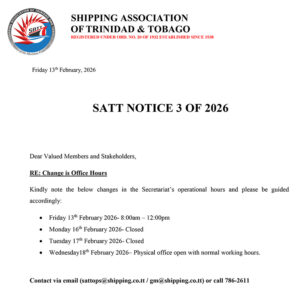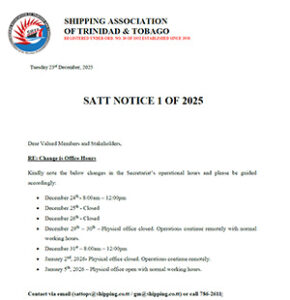GEISHA KOWLESSAR-ALONZO Senior Multimedia Reporter geisha.kowlessar@guardian.co.tt
Shipping companies are concerned that a newly implemented policy by the Customs and Excise Division will lead to significant delays and increased costs.
This comes as on Monday, Customs advised that all less-than container-load cargo must be scanned before being deposited or stored in any transit shed, while the port transfer record must reflect completed scanning information before cargo is permitted to be removed from storage to the transit shed.
It also noted that the port transfer record (PTR) or equivalent movement document must reflect completed scanning information before cargo is permitted to be removed from storage to the transit shed. The notice added that to support the policy mobile container scanners are in place at the ports of Point Lisas and Port-of-Spain and at package and pallet scanners at transit sheds.
Customs said these systems play a critical role in strengthening the national border security chain.
However, the shipping companies said there currently are not enough scanners to efficiently support this policy.
Chaguanas Chamber of Industry and Commerce president Baldath Maharaj commended the commitment to modernise border control systems to better protect the country and support a safer trading environment.
However, he said the sudden rollout of these measures, which came into effect on May 5—just two days after formal notification—has caused significant concern among importers and logistics providers.
“While it may be too early to assess the full extent of the operational impact, we anticipate potential delays due to the high volume of cargo and the limited time stakeholders were given to prepare.
“Given the scale of trade activity at the ports of Port-of-Spain, Point Lisas, and private transit sheds, it is uncertain whether the current scanning capacity will be sufficient to manage the increased demand without creating bottlenecks,” Maharaj explained.
He urged the Customs and Excise Division to closely monitor the implementation process, maintain open communication with stakeholders and consider adjustments or support mechanisms where necessary to avoid disruption to the supply chain. The Chaguanas chamber stressed that it stood ready to support constructive dialogue and collaborative solutions that balance security imperatives with trade efficiency.
President of the Shipping Association of T&T, Troy Persad, explained to Guardian Media that there are some transit sheds which are still to implement and/ or operationalise their package and pallet scanner systems. As such, based on the implementation of the new measures, there has been a reduction in capacity related to the number of transit sheds, which are able to process cargo.
On how this has affected the body’s membership, Persad said the association was liaising with members to determine the actual impact. However, he expects members to face some delays in the unstuffing of cargo, with potential cost implications.
Persad added that information would be communicated with the Customs and Excise Division as well as sharing information with the Joint Consultative Customs Committee ( JCCC), which is a consultative body.
A member of the association said scanning equipment could cost as much as US$250,000.

Source: e-paper.guardian.co.tt





